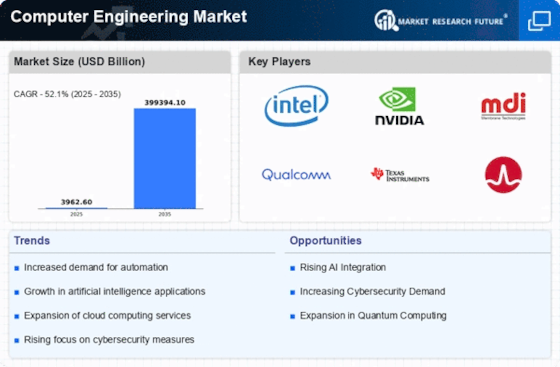Top Industry Leaders in the Computer Engineering Market
Competitive Landscape of Computer Engineering Market
The computer engineering market encompasses the design, development, and implementation of computer hardware and software. It is a dynamic and ever-evolving landscape, driven by the constant demand for faster, more powerful, and efficient computing solutions. This market fosters a competitive environment where established companies and emerging players vie for market share.
Key Players:
- Advantest Corporation
- Advint (Advanced Integration)
- Ansys
- ARM Holdings
- Astronics Corporation
- Autodesk
- Averna Technologies
- Cadence Design Systems
- Marvell
- Cobham
- Cypressmiconductor Corporation
- Dassault Systemes
- Future Technology Devices International (FTDI Chip)
- Infineon Technologies
- Intel Corporation
Strategies Adopted:
- Product Innovation: Companies compete by continuously innovating their product offerings, focusing on performance improvements, power efficiency advancements, and integration of new functionalities like AI and machine learning capabilities.
- Mergers and Acquisitions: Strategic acquisitions and partnerships allow companies to expand their product portfolios, gain access to new technologies and markets, and consolidate their positions within the industry.
- Globalization: Expanding into new geographical markets, particularly in emerging economies with growing demand for computer engineering solutions, is a key strategy for many key players.
- Focus on New Applications: Companies are increasingly focusing on emerging applications like AI, cloud computing, and the Internet of Things (IoT), creating new market opportunities and fostering collaborations with companies in adjacent industries.
Factors for Market Share Analysis:
- Market Share: The specific percentage of the overall market revenue held by a particular company.
- Revenue Generation: The total income generated from the sale of computer engineering products and services.
- Product Portfolio: The range and diversity of products offered by a company, catering to different segments of the market (e.g., personal computing, enterprise computing, mobile computing).
- Geographical Reach: The presence and market share of a company in different regions around the world.
- Brand Recognition: The level of awareness and reputation a company enjoys within the industry and its target markets.
- Research and Development (R&D) Investment: The level of investment a company dedicates to R&D, reflecting its commitment to innovation and future growth potential.
New and Emerging Companies:
The computer engineering market is not only dominated by established players. Several innovative startups and smaller companies are making their mark on the industry, often specializing in specific niches or developing disruptive technologies. Some notable examples include:
- RISC-V International: A non-profit organization promoting the RISC-V open-source instruction set architecture, offering an alternative to traditional processor architectures dominated by Intel and AMD.
- Wave Computing: A company developing innovative AI processing units (IPUs) designed specifically for AI and deep learning workloads, targeting high-performance computing applications.
- Graphcore: A company specializing in Intelligence Processing Units (IPUs) optimized for large-scale machine learning models, offering faster and more efficient training and inference capabilities.
Current Company Investment Trends:
Companies in the computer engineering market are actively engaged in mergers and acquisitions, strategic partnerships, and significant investments in research and development (R&D). These investments are driven by the need to stay ahead of the competition, capitalize on emerging trends, and develop cutting-edge technologies that will shape the future of computing.
Latest Company Updates:
February 23, 2024 - TSMC, the world's largest contract chipmaker, announces plans to invest $12 billion in building a new chip fabrication plant in Arizona, reflecting the growing demand for advanced semiconductors and the ongoing chip shortage.
February 17, 2024 - The European Union developing its own semiconductor industry, aiming to reduce its reliance on Asian chipmakers and bolster its technological independence.
February 14, 2024 RISC-V International reports a surge in membership, with over 300 companies now joining the organization promoting the open-source RISC-V processor architecture, indicating growing industry interest in alternative architectures beyond those dominated by established players.
February 10, 2024 - Nvidia and Microsoft announce a strategic partnership to develop cloud computing solutions specifically optimized for AI and machine learning workloads, leveraging Nvidia's GPUs and Microsoft's Azure cloud platform.










